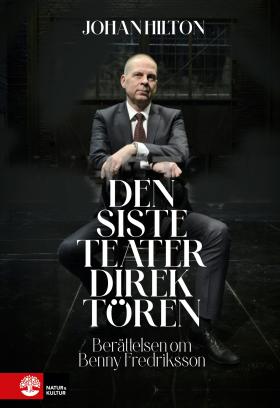
Den siste teaterdirektören. Berättelsen om Benny Fredriksson
(The Last of the Theatre Managers. The story about Benny Fredriksson)
by Johan Hilton
reviewed by Anna Paterson
After a prologue offering us a glimpse of the tragedy to come, and a short account of Benny’s early years in a bleak Stockholm suburb – ‘Act 1, Scene 2’ – his story is interrupted by the first instalment of a process that first ruined his professional ambitions and, a few months later, made him end his life.
By early autumn 2017, Metoo-related posts began to appear in Swedish media. The actor Sofia Helin – aka DI Saga Norén in The Bridge – wanted to write a proper debating piece in a leading newspaper, but backed off because it wouldn’t let her be anonymous. Instead, Helin shared her piece with friends in a Facebook forum. Within twenty-four hours, over one thousand actors had become active contributors. The online group agreed on anonymity and a memorable hashtag: #tystnadtagning or ‘quietonset’.
Once the actors started to post their stories of serious misbehaviour by male colleagues, the idea was followed up in several other job-related hashtags. As everyone’s anger increasingly merged into a wave of mass indignation, other media, and notably the press, became very interested. Then, a leading daily paper published a long article on patriarchal assumptions, backed by allegations made by mainly anonymous women against men in film and theatre. The individuals were often identifiable by tags such as ‘a leading actor in the same production’, ‘A Recognised Male Genius’ etc. It made an instant impact – ‘explosive’ is Hilton’s word. As he shows in several careful accounts, based on records and interviews, one of its effects was to provide an impetus for scandalously poor journalism.
At this point, the narrative shifts to a schoolboy Benny, hungry for a better class of life, for culture in general and the theatre in particular. He discovers works by Sartre in the school library and, for the rest of his life, holds on to the dictates of acting on your existential choices. Not selfishly, though: from an early stage, Benny is also interested by the political scene.
Fast forward to 2017: Benny, now the highly respected manager of Stockholm City Theatre, faces a public debate of #tystnadtagning’s allegations. Already, ‘the movement’ has acquired an unyielding self-righteousness: Hilton, as ever backing his opinions with recorded evidence, likens the raised voices of the accusers to the threatening chorus of the Furies, goddesses of vengeance and justice in Greek mythology.
By now, the reader is hooked. Tense and dramatic – filmic? – the structure of this remarkable book justifies the slow, careful unravelling of who said what to whom. Benny began his career as a moderately successful actor but later became a widely admired manager and director, with a commitment to public outreach and to the policies of the elected city government. At this stage, the story of his life is positively uplifting. And, because Benny Fredriksson lived for his job, the narrative also offers a fascinating overview of Swedish theatre in the first sixteen years of this century.
It was a shock when, in the alternative reality of autumn 2017, he turned first into a suspect, then a convicted felon.
By the end of November 2017, detailed and largely uncontested allegations were piling up. He had not only tolerated aggression and sexual harassment by his male favourites among actors and directors but behaved in odd and outrageous ways. The narrative now reads like an illustration of the line ‘If you strike at a king, you must kill him’. Some colleagues did speak up for him, but to little effect.
Benny Fredriksson resigned from his job on 7 December 2017, but could not cope with the loss. He became, by stages, deeply depressed with paranoid delusions. His wife, the opera singer Anne-Sofie von Otter, supported him throughout, and in March 2018, he joined her on an engagement in Australia and New Zealand. Travelling was not the cure they hoped for, and the journey ended with his suicide in a hotel room.
In an epilogue, Johan Hilton describes the subdued aftermath in Stockholm. Accusations against the media mix with the celebrations of the dead man, which culminated with a grand performance ‘in memoriam’ on the main stage of the City Theatre where people reassured each other that ‘Benny lives forever’.

Den siste teaterdirektören. Berättelsen om Benny Fredriksson
Natur & Kultur, 2024
434 pages
Foreign Rights: Richard Herold, Natur & Kultur
Johan Hilton is a journalist, writer and broadcaster who specialises in cultural reporting. His books include No Tears for Queers (Atlas, 2005) and Monster i garderoben (‘Monsters in the Closet’). The latter is a study of Hitchcock’s film Psycho and its damaging effect on Anthony Perkins’s career (NoK, 2015). Vi är Orlando (‘We Are Orlando’) is a discursive investigation into a shooting in an HBTQI club in Orlando (NoK, 2020).
